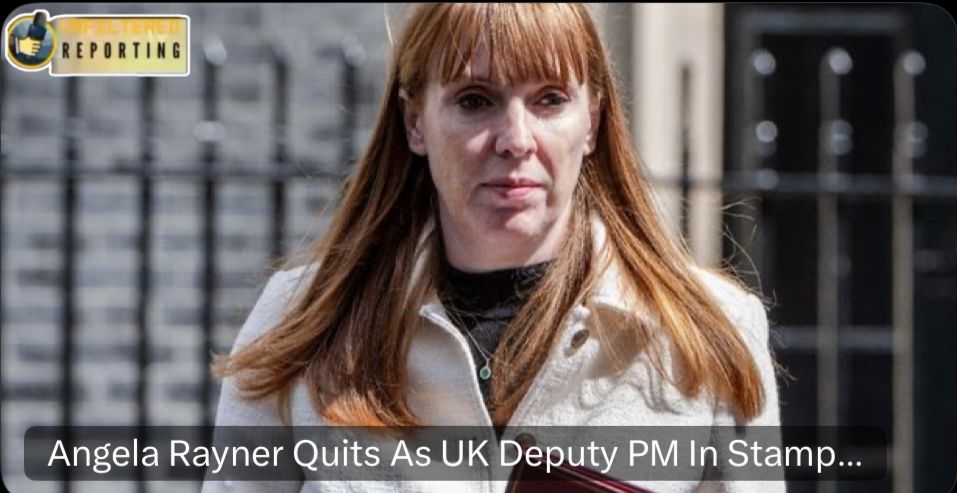British Deputy PM, Angela Rayner’s Resigns Amid Property Tax Scandal

Angela Rayner has resigned as Britain’s Deputy Prime Minister after an inquiry into her property dealings concluded she breached ministerial rules, triggering a political storm that has shaken Labour’s leadership and handed fresh momentum to Reform UK. Rayner, who also held the housing and communities portfolio and served as Deputy Leader of the Labour Party, confirmed her resignation in a letter to Prime Minister Keir Starmer on Friday.
She admitted that she made a serious error by failing to seek specialist tax advice during a property transaction, which later revealed she had underpaid Stamp Duty Land Tax (SDLT). “I deeply regret my decision not to seek additional specialist tax advice,” Rayner wrote.
“Although I relied on legal opinions provided at the time, I now accept that I fell short of the highest standards expected of ministers. I take full responsibility for this mistake and have already moved to settle the outstanding liability.” The controversy began earlier this year after Rayner purchased a flat in Hove while transferring her share of a family home into a trust for her son.
At the time, she relied on written legal opinions suggesting that the lower SDLT rate applied. However, those opinions carried caveats urging her to seek specialist advice, which she did not do. The independent adviser on ministerial standards, Sir Laurie Magnus, concluded that this oversight amounted to a breach of the ministerial code, even though Rayner had acted in good faith.
Prime Minister Starmer accepted her resignation, praising her record but acknowledging the seriousness of the breach. “Angela has been a formidable colleague, a tireless champion for working people, and a vital bridge within our movement,” Starmer said in a statement. “But she has also done the right thing by taking responsibility.” The resignation is a major setback for Labour’s government.
Rayner was not only Starmer’s deputy but also one of the party’s most recognisable and outspoken figures, admired for her ability to connect with grassroots members as well as appeal to centrist voters. Her departure creates three major vacancies — Deputy Prime Minister, Housing Secretary, and Deputy Party Leader — and threatens to reopen Labour’s internal divisions at a time when party unity is crucial. For Labour, the timing could not be worse.
The government is already under mounting pressure over its handling of the economy, public services, and immigration. Now, the scandal has fuelled accusations of hypocrisy, with opposition parties claiming that Labour has failed to uphold the very standards it promised to restore. The Conservatives were quick to criticise. A party spokesperson said the resignation “exposes Labour’s hollow claims of integrity and competence.” Meanwhile, Reform UK — already enjoying a surge in the polls — seized the moment to strengthen its anti-establishment message.
Richard Tice, the party’s leader, declared that “Angela Rayner’s downfall shows the rot at the heart of Labour. Reform UK is now the only real alternative to a failed political class.” The incident adds to a string of ministerial departures in Starmer’s government since Labour came to power. While most have been lower-profile, Rayner’s resignation is by far the most damaging, given her central role in shaping both government policy and Labour’s identity.
Analysts warn the scandal risks deepening voter distrust in mainstream politics while boosting support for populist challengers. Political commentators also note the personal cost for Rayner, who has faced weeks of intense public scrutiny. In her resignation letter, she admitted the saga had caused “immense strain” on her family and said that, while she always sought to act in good faith, she ultimately “did not meet the standards required of those in public life.”
The Labour leadership now faces urgent decisions: how to restructure its top team, how to reassure voters about its ethical standards, and how to prevent Reform UK from exploiting the crisis further. With public confidence in flux, the coming weeks may prove decisive in shaping both Labour’s credibility and Britain’s political landscape.









